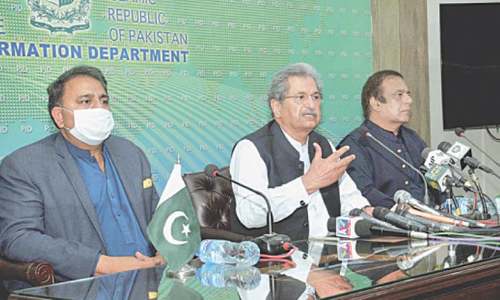ISLAMABAD: Dispelling the impression that there is a deadlock between the government and the opposition on the appointment of members of the Election Commission of Pakistan (ECP), Minister for Information Fawad Chaudhry on Tuesday said Prime Minister Imran Khan would consult Leader of the Opposition in the National Assembly Shehbaz Sharif on the issue in accordance with the Constitution.
The minister, however, ruled out the possibility of direct consultation between the two, saying it might be done through correspondence.
The minister’s remarks came amid ongoing discussions in political and legal circles regarding a possible delay in the appointment following the retirement of two ECP members from Punjab and Khyber Pakhtunkhwa on July 26 after completion of their five-year constitutional term.
In 2019, the Pakistan Tehreek-i-Insaf government had missed the constitutional deadline of 45 days for the appointment of two ECP members from Sindh and Balochistan when Prime Minister Imran Khan refused to hold direct and mandatory consultation with the opposition leader on the issue. However, the prime minister later consulted Shehbaz Sharif through correspondence when the issue landed at the Islamabad High Court.
Dispels impression there is deadlock between government and opposition on the issue
The same thing happened at the time of appointment of the chief election commissioner (CEC) last year.
Talking to Dawn, the information minister once again ruled out the possibility of a direct meeting between the prime minister and the opposition leader, saying it’s “not necessary”.
Fawad Chaudhry said there were various forms of consultations and it could be done through correspondence as happened previously.
On the other hand, Pakistan Peoples Party (PPP) vice president Sherry Rehman asked the prime minister to complete the process of appointment of the ECP members after consultation with the opposition leader within 45 days as prescribed in the Constitution.
In a statement, Ms Rehman, who is also parliamentary leader of the PPP in the Senate, recalled that previously the appointment of ECP members from Sindh and Balochistan had been delayed for a whole year which was a violation of the Constitution.
Similarly, she said, in the past the government had not cared for the constitutional provisions regarding the appointment of the CEC. She said that in democracies key constitutional offices were filled with a consensus between the government and the opposition.
The information minister, however, dispelled the opposition’s fear regarding any delay in the appointment of ECP members and said Prime Minister Khan had been struggling for a transparent electoral system. He said a strong election commission enjoying confidence of all political parties was in the interest of the country.
The government, he said, also wanted to move forward with an open heart on electoral reforms and on laws relating to the National Accountability Bureau (NAB). “We want a consensus in parliament on major issues. Stability of the political system lies in the respect for the Constitution,” he said, adding that consensus on issues like elections, accountability and national security would strengthen the country’s political system.
The issue of appointment of ECP members from Sindh and Balochistan could not be resolved in 2019 for at least one year though the members were to be appointed within 45 days of their retirement as per the law.
Under the Constitution, the ECP comprises chief election commissioner and four members — one from each province. Article 215(4) inserted in the Constitution through the 22nd Amendment reads: “Vacancy in the office of the commissioner or a member shall be filled within 45 days.”
The mechanism for retirement of two members after their half-term in office was also put in place through the 22nd Amendment to ensure the continuity of the electoral body. Article 215(1) of the Constitution in its amended form reads: “The Commissioner [and a member] shall, subject to this Article, hold office for a term of five years from the day he enters upon his office.”
A proviso to the article reads: “Provided that two of the members shall retire after the expiration of the first two and a half years and two shall retire after the expiration of the next two and a half years: Provided further that the Commission shall for the first term of office of members draw a lot as to which two members shall retire after the first two and a half years.”
However, under the amended law, it was a one-time arrangement meaning that in future all members will complete their five-year tenure.
Under Articles 213 and 218 of the Constitution, the prime minister in consultation with the opposition leader forwards three names for the appointment of a CEC or commission member to a parliamentary committee for confirmation of one name.
The parliamentary committee, constituted by the National Assembly speaker, draws half its members from the treasury benches and half from opposition parties, based on their strength in parliament, to be nominated by their respective parliamentary leaders.
In case a consensus cannot be reached between the prime minister and the opposition leader, the law says that each will forward separate lists to the parliamentary committee for the hearing and finalisation of names.
Published in Dawn, July 28th , 2021














































